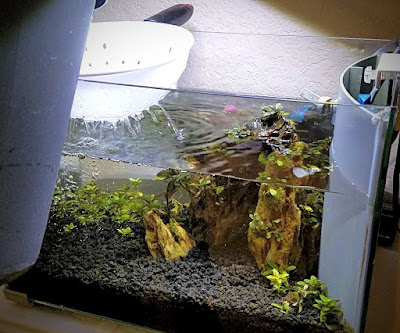When I was a kid, a betta fish was one of my first aquatic pets because they’re so beautiful and interactive. Unfortunately, I found it a pain to clean his bowl because I always had to catch him, dump out all the glass marbles, scrub them in the sink, and then transfer everything back. (Kids, don't try this at home.) Eventually, I started avoiding this time-consuming chore and… eventually, my betta fish got sick and died from living in his own waste. Poor thing!
Little did I know that there existed a miracle tool that has saved me so much time and energy, so I can actually enjoy keeping fish. Let me introduce you to the aquarium siphon (also known as a gravel cleaner). This simple hose is like vacuum cleaner but without any electronics – and it’s about to become your best friend!
 |
| The Python mini siphon is my go-to tool for cleaning betta fish tanks. |
How to Do a Simple Water Change
So let me cover how to do a simple water change for your betta fish, which will only take you 5-10 minutes at most. You’ll need 3 things: a mini siphon (linked above), water dechlorinator, and a bucket with a pour spout that’s big enough to hold at least 50% of the tank water- Remove the lid on the aquarium and turn off heater and filter.
- In order to start “vacuuming” your fish tank, put the big tube end of the siphon in the tank and make sure the small hose end goes in the bucket.
How to Start a Siphon
You can start water moving through the siphon simply by dipping the upright tube into the tank, raising it up out of the water, and then before the water totally drains out of the tube, quickly plunge it back into the tank.
Once you notice water moving into the bucket, you can invert the tube and start vacuuming the bottom of the tank to remove fish poop, uneaten food, and other detritus.
- When you’ve finished vacuuming and have removed 25-50% of the tank water, take out the siphon and empty the bucket. (Old fish water is good fertilizer for houseplants.) Then fill the bucket with warm tap water that matches the tank temperature.
- Add water dechlorinator to the bucket (or directly in the tank), and refill the aquarium.
- Turn back on your heater and filter, replace the tank lid, and you’re done!
How to Deep Clean the Tank
Now a water change once a week is pretty easy, but once a month, I like to do a deep cleaning on the aquarium. Here’s my detailed routine, which also includes a few extra steps you may need if you’ve upgraded your betta fish to a planted tank. You’re going to need all the materials from before, as well as a water test kit, algae scraper, fertilizer, and maybe some aquascaping tools.- Remove the lid and use your test kit to test the water quality to make sure all’s well.
- Use your algae scrubber to remove algae off from the walls, plants, and décor. (I personally like to use a razor blade and toothbrush for my glass aquarium.)
- If you have live plants, now’s your time to trim and remove any dead leaves.
- Turn off the heater and filter, and begin gravel vacuuming the substrate like before.
- Clean your filter sponge or other media in old tank water (or you can be brave like Prime Time Aquatics and wash them in running tap water).
- Empty out the bucket, fill it with warm tap water, and add your dechlorinator.
- Pour your water in the tank. (I like to use a clean plastic bag or colander to pour the water on, so that the water won't disturb the decor.)
- Turn on the heater and filter, and add fertilizers as needed.
 |
| Pouring water through a colander when refilling the tank will prevent your aquascape from being disturbed. |
Bonus Tips
I’ve also got some extra tips for keeping your betta fish tank clean without a lot of extra effort, such as:- Add a gentle filter to keep the water from getting stagnant and gross.
- Don’t overfeed your betta fish because less food = less poo.
- Consider getting a bigger tank of 3 gallons or more because more water volume means it’ll take longer for your betta fish to dirty the water (and you can do fewer water changes overall).


No comments:
Post a Comment